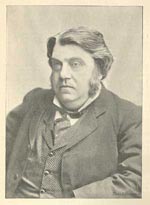
Voltaire
Philosophical Dictionary: Beasts
「1764」 Voltaire「Francois Marie Arouet」, “Beasts,” in The Philosophical Dictionary, for the Pocket「Google Books」(1764; Glasgow, 1766) 33-37.
This dog, so very superior to man in affection, is seized by some barbarian virtuosos, who nail him down to a table, and dissect him while living, the better to shew you the meseraic veins. All the same organs of sensation which are in yourself you perceive in him. Now, Machinist, what say you? answer me, has Nature created all the springs of feeling in this animal, that it may not feel? Has it nerves to be impassible? For shame ! charge not Nature with such weakness and inconsistency. (34-5)
Beasts
Is it possible that any one should say,or affirm in writing, that Beasts are machines, void of knowledge and sense, have a sameness in all their operations, neither learning nor perfecting any thing, etc.
How ! this bird which makes a semicircular nest when he fixes it against a wall; who, when in an angle, shapes it like a quadrant; and circular, when he builds it in a tree; is this having a sameness in its operations? Does this hound, after three months teaching, know no more than when you first took him in hand? Your Canary-bird, does he repeat a tune at first hearing? or rather, is it not some time before you can bring him to it? is he not often out, and does he not improve by practice?
Is it from my speaking that you allow me sense, memory, and ideas ? Well; I am silent; but you see me come home very melancholy, and with eager anxiety look for a paper, open the bureau where I remember to have put it, take it up and read it with apparent joy. You hence infer, that I have felt pain and pleasure, and that I have memory and knowledge.
Make then the like inference concerning this dog, who, having lost his master, runs about everywhere with melancholy yellings, comes home all in a ferment, runs up and down, roves from room to room, till at length he finds his beloved master in his closet, and then expresses his joy in softer cries, gesticulations, and fawnings.
This dog, so very superior to man in affection, is seized by some barbarian virtuosos, who nail him down to a table, and dissect him while living, the better to shew you the meseraic veins. All the same organs of sensation which are in yourself you perceive in him. Now, Machinist, what say you? answer me: Has Nature created all the springs of feeling in this animal, that it may not feel? has it nerves to be impassible? For shame ! charge not Nature with such weakness and inconsistency.
But the scholastic doctors ask what the soul of beasts is ? This is a question I do not understand. A tree has the faculty of receiving sap into its fibres, of circulating it, of unfolding the buds of its leaves and fruits. Do you now ask me what the soul of a tree is? It has received these properties, as the animal above has received those of sensation, memory, and a certain number of ideas. Who formed all these properties? who has imparted all these faculties? He who causes the grass of the field to grow, and the earth to gravitate towards the sun.
The souls of beasts have substantial forms, says Aristotle; who has been followed by the Arabian school, and this by the Angelic school, and the Angelic school by the Sorbonne, and the Sorbonne by no body in the world.
The souls of beasts are material, is the cry of other philosophers; but as little to the purpose of the former. When called upon to define a material soul, they only perplex the cause: they must necessarily allow it to be sensitive matter. But whence does it derive this sensation? From a material soul; which must mean, that it is matter giving sensation to matter; beyond this circle they have nothing to say.
According to others, equally wise, the soul of beasts is a spiritual essence, dying with the body: But where are your proofs ? what idea have you of this spiritual being, which, with its sensation, memory, and its share of ideas and combination, will never be able to know so much as a child of six years? What grounds have you to think that this incorporeal being dies with the body? But still more stupid are they who affirm this soul to be neither body nor spirit. A fine system truly! By spirit we mean only something unknown, which is not body; so that the upshot of this wise system is, that the soul of beasts is a system, which is neither body, nor something which is not body.
Whence can so many contradictory errors arise? From a custom which has always prevailed among men of investigating the nature of a thing before they knew whether any such thing existed. The sucker of clapper of a bellows is likewise call the soul of the bellows. Well, what is this soul? it is only a name I have given to that sucker or clapper, which falls down, lets in the air, and rising again, propels it through a pipe on my working the bellows.
Here is no soul distinct from the machine itself; but who puts the bellows of animals in motion? I have already told you; he who puts the heavenly bodies in motion. The philosopher who said, Dues est anima brutorum, was in the right; but he should have gone farther*.
*This is the Pythagorean system, “Quod Dues sit anima mundi.” See Ruæus on Virg ´n.lib.vi.ver.726.



